Management Industry Project Proposal: Problem Analysis & Solutions
VerifiedAdded on 2023/04/24
|8
|2338
|391
Project
AI Summary
This industry project proposal examines managerial problems within the Stamford Plaza Melbourne hotel, focusing on the issue of long and irregular working hours faced by employees. The project begins with an introduction to the hotel, highlighting its services and location. It then identifies several managerial problems, including the need to keep up with technology, irregular working hours, seasonality of the hospitality industry, changing customer expectations, and maintenance and renovation costs. The scope of the project is defined within the context of the New Zealand hospitality industry. The proposal selects and analyzes the problem of long and irregular working hours, linking it to concepts such as organizing and tools like TQM. The analysis explores the negative impacts of these working conditions on employee health, work-life balance, and job satisfaction. The proposal suggests that if the working hours for the staff are properly organized by the managers, the irregularity in the working hours can be easily avoided. The proposal uses relevant references to support its claims.
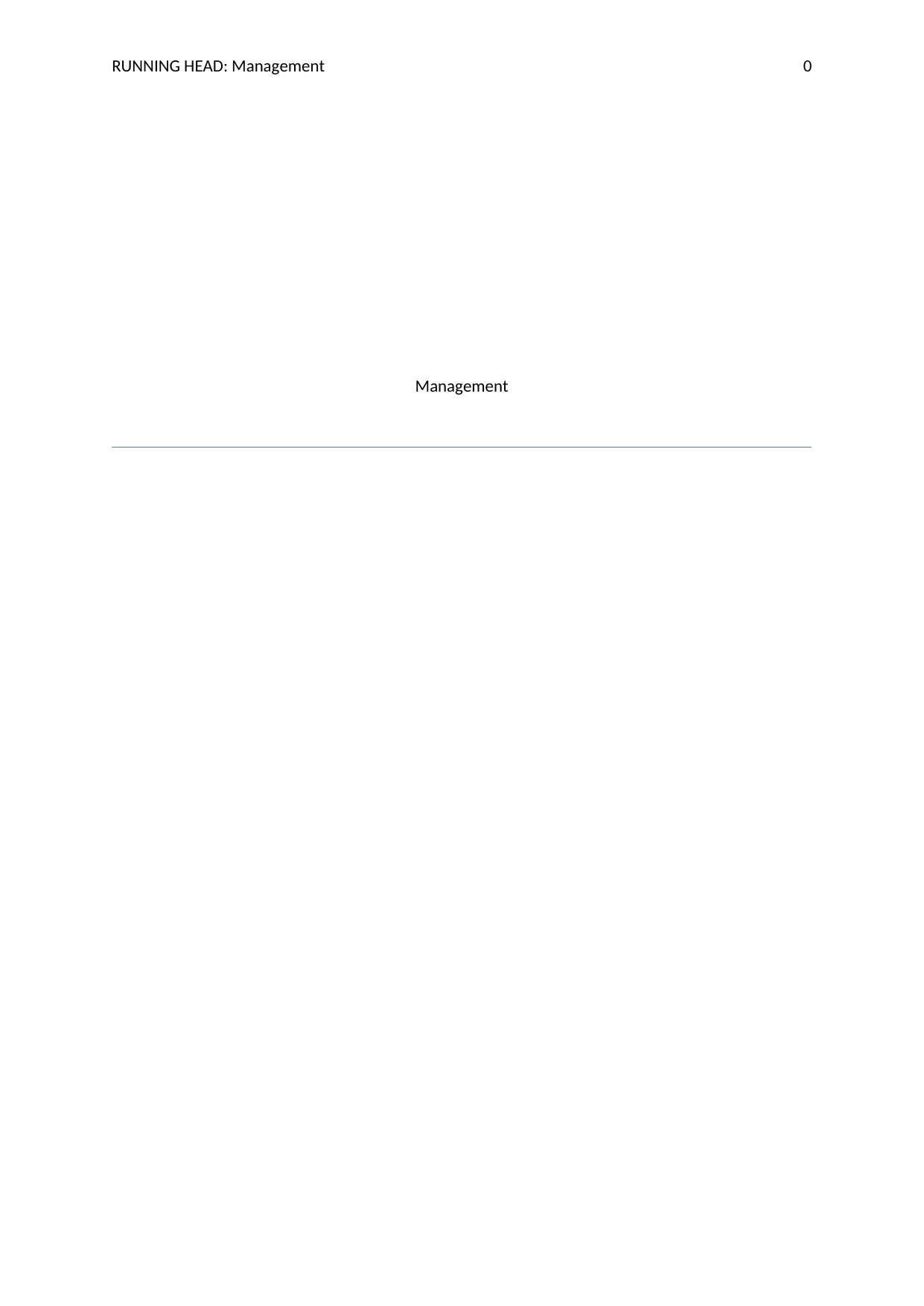
RUNNING HEAD: Management 0
Management
Management
Paraphrase This Document
Need a fresh take? Get an instant paraphrase of this document with our AI Paraphraser
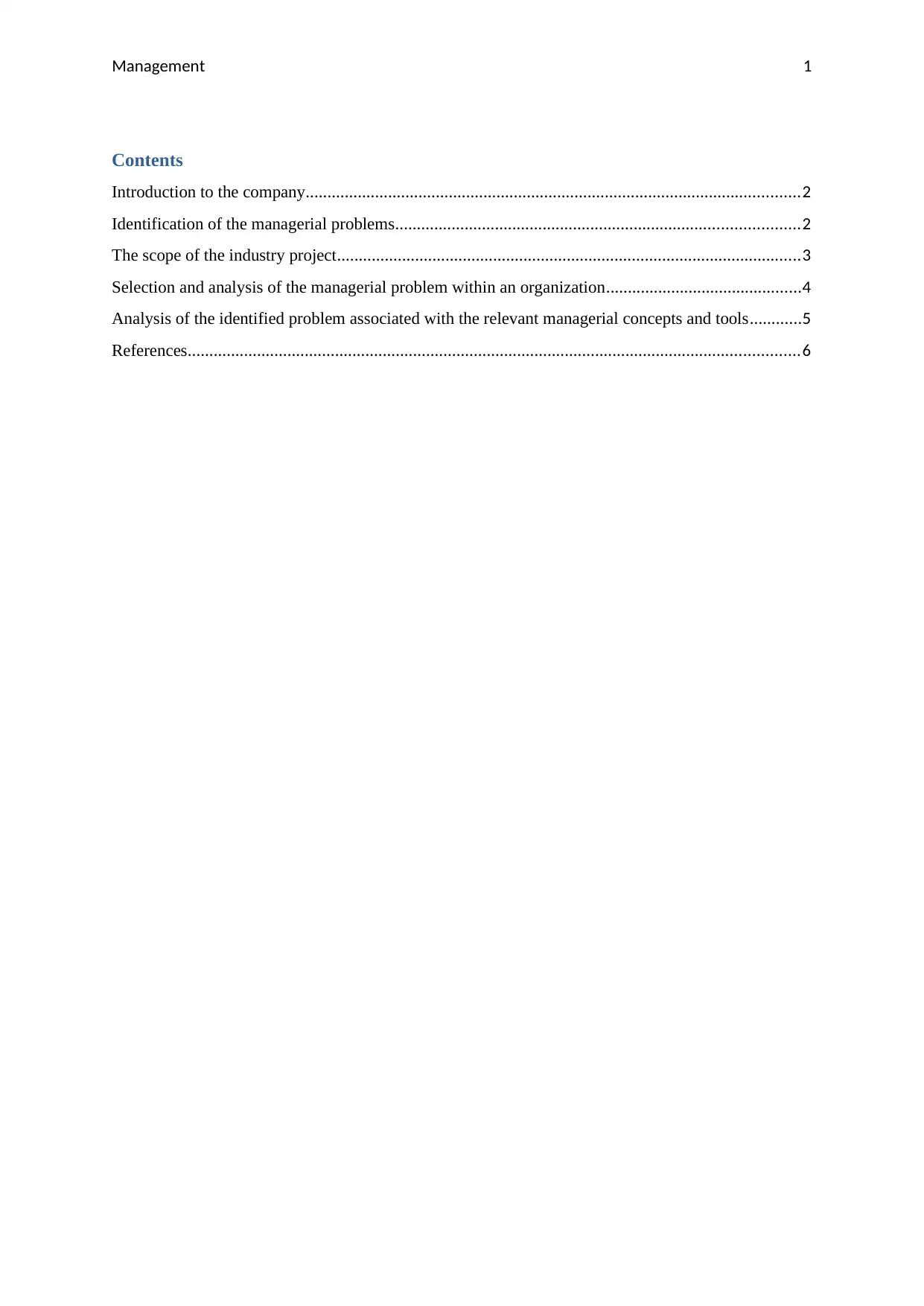
Management 1
Contents
Introduction to the company..................................................................................................................2
Identification of the managerial problems.............................................................................................2
The scope of the industry project...........................................................................................................3
Selection and analysis of the managerial problem within an organization.............................................4
Analysis of the identified problem associated with the relevant managerial concepts and tools............5
References.............................................................................................................................................6
Contents
Introduction to the company..................................................................................................................2
Identification of the managerial problems.............................................................................................2
The scope of the industry project...........................................................................................................3
Selection and analysis of the managerial problem within an organization.............................................4
Analysis of the identified problem associated with the relevant managerial concepts and tools............5
References.............................................................................................................................................6
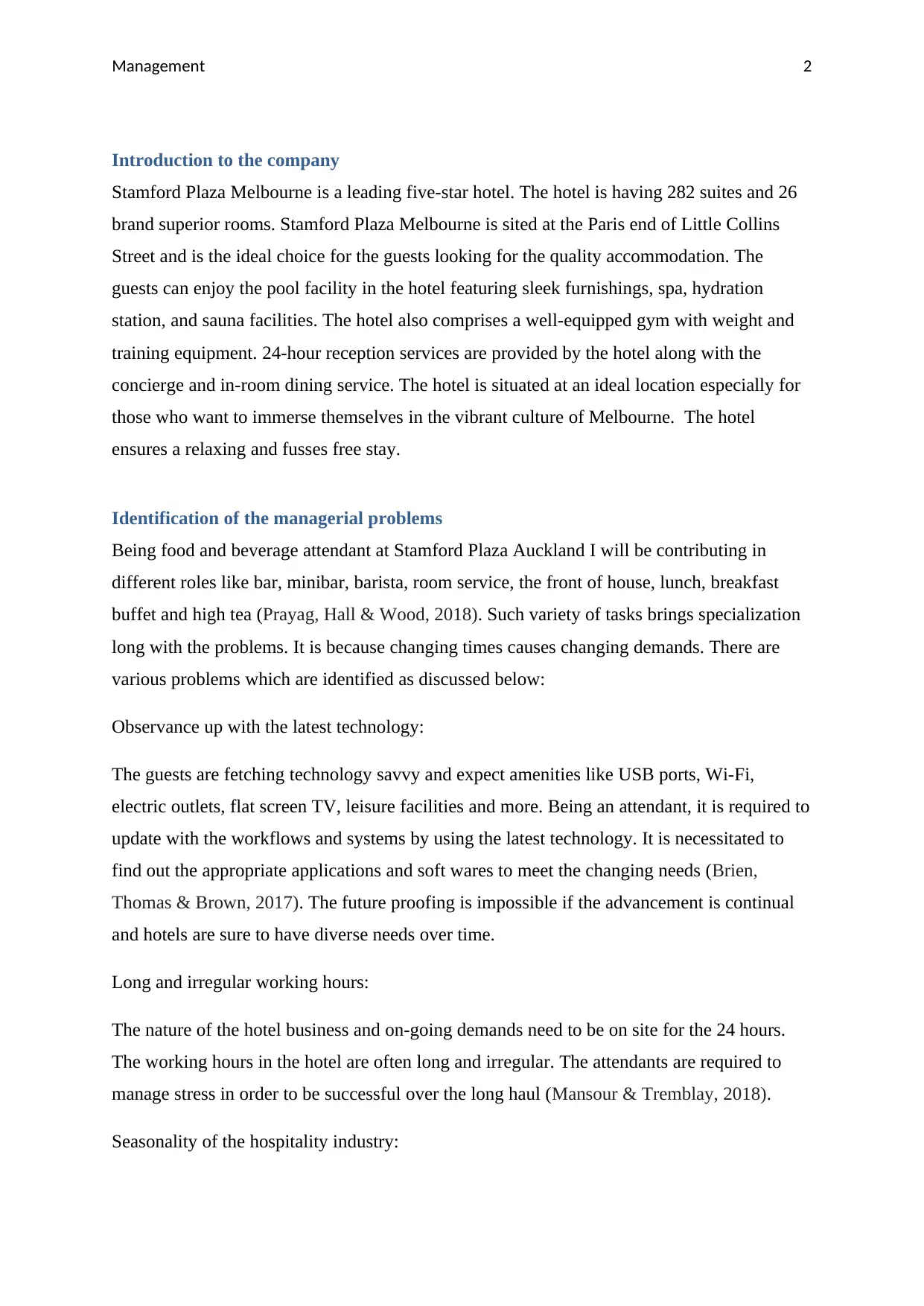
Management 2
Introduction to the company
Stamford Plaza Melbourne is a leading five-star hotel. The hotel is having 282 suites and 26
brand superior rooms. Stamford Plaza Melbourne is sited at the Paris end of Little Collins
Street and is the ideal choice for the guests looking for the quality accommodation. The
guests can enjoy the pool facility in the hotel featuring sleek furnishings, spa, hydration
station, and sauna facilities. The hotel also comprises a well-equipped gym with weight and
training equipment. 24-hour reception services are provided by the hotel along with the
concierge and in-room dining service. The hotel is situated at an ideal location especially for
those who want to immerse themselves in the vibrant culture of Melbourne. The hotel
ensures a relaxing and fusses free stay.
Identification of the managerial problems
Being food and beverage attendant at Stamford Plaza Auckland I will be contributing in
different roles like bar, minibar, barista, room service, the front of house, lunch, breakfast
buffet and high tea (Prayag, Hall & Wood, 2018). Such variety of tasks brings specialization
long with the problems. It is because changing times causes changing demands. There are
various problems which are identified as discussed below:
Observance up with the latest technology:
The guests are fetching technology savvy and expect amenities like USB ports, Wi-Fi,
electric outlets, flat screen TV, leisure facilities and more. Being an attendant, it is required to
update with the workflows and systems by using the latest technology. It is necessitated to
find out the appropriate applications and soft wares to meet the changing needs (Brien,
Thomas & Brown, 2017). The future proofing is impossible if the advancement is continual
and hotels are sure to have diverse needs over time.
Long and irregular working hours:
The nature of the hotel business and on-going demands need to be on site for the 24 hours.
The working hours in the hotel are often long and irregular. The attendants are required to
manage stress in order to be successful over the long haul (Mansour & Tremblay, 2018).
Seasonality of the hospitality industry:
Introduction to the company
Stamford Plaza Melbourne is a leading five-star hotel. The hotel is having 282 suites and 26
brand superior rooms. Stamford Plaza Melbourne is sited at the Paris end of Little Collins
Street and is the ideal choice for the guests looking for the quality accommodation. The
guests can enjoy the pool facility in the hotel featuring sleek furnishings, spa, hydration
station, and sauna facilities. The hotel also comprises a well-equipped gym with weight and
training equipment. 24-hour reception services are provided by the hotel along with the
concierge and in-room dining service. The hotel is situated at an ideal location especially for
those who want to immerse themselves in the vibrant culture of Melbourne. The hotel
ensures a relaxing and fusses free stay.
Identification of the managerial problems
Being food and beverage attendant at Stamford Plaza Auckland I will be contributing in
different roles like bar, minibar, barista, room service, the front of house, lunch, breakfast
buffet and high tea (Prayag, Hall & Wood, 2018). Such variety of tasks brings specialization
long with the problems. It is because changing times causes changing demands. There are
various problems which are identified as discussed below:
Observance up with the latest technology:
The guests are fetching technology savvy and expect amenities like USB ports, Wi-Fi,
electric outlets, flat screen TV, leisure facilities and more. Being an attendant, it is required to
update with the workflows and systems by using the latest technology. It is necessitated to
find out the appropriate applications and soft wares to meet the changing needs (Brien,
Thomas & Brown, 2017). The future proofing is impossible if the advancement is continual
and hotels are sure to have diverse needs over time.
Long and irregular working hours:
The nature of the hotel business and on-going demands need to be on site for the 24 hours.
The working hours in the hotel are often long and irregular. The attendants are required to
manage stress in order to be successful over the long haul (Mansour & Tremblay, 2018).
Seasonality of the hospitality industry:
⊘ This is a preview!⊘
Do you want full access?
Subscribe today to unlock all pages.

Trusted by 1+ million students worldwide
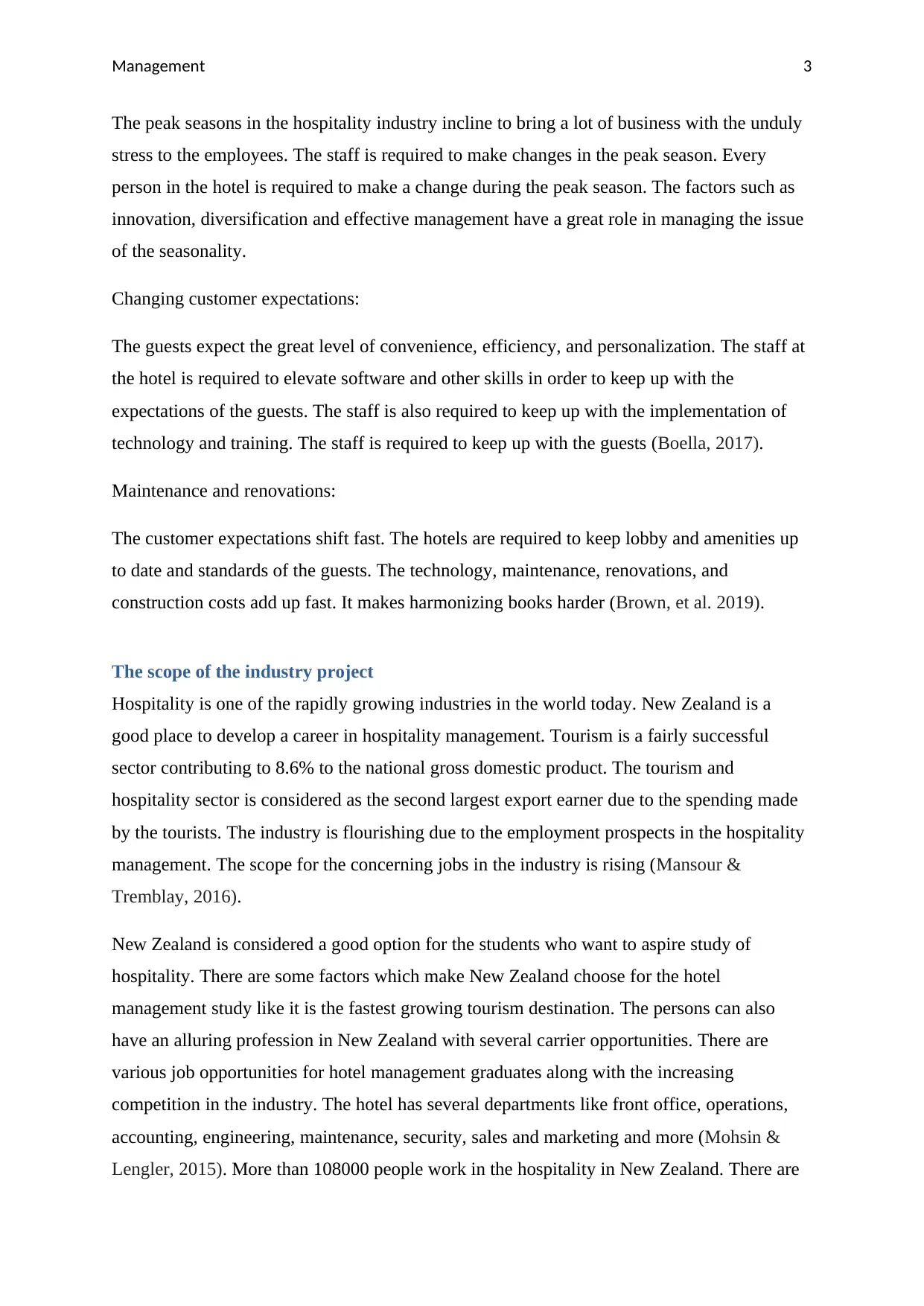
Management 3
The peak seasons in the hospitality industry incline to bring a lot of business with the unduly
stress to the employees. The staff is required to make changes in the peak season. Every
person in the hotel is required to make a change during the peak season. The factors such as
innovation, diversification and effective management have a great role in managing the issue
of the seasonality.
Changing customer expectations:
The guests expect the great level of convenience, efficiency, and personalization. The staff at
the hotel is required to elevate software and other skills in order to keep up with the
expectations of the guests. The staff is also required to keep up with the implementation of
technology and training. The staff is required to keep up with the guests (Boella, 2017).
Maintenance and renovations:
The customer expectations shift fast. The hotels are required to keep lobby and amenities up
to date and standards of the guests. The technology, maintenance, renovations, and
construction costs add up fast. It makes harmonizing books harder (Brown, et al. 2019).
The scope of the industry project
Hospitality is one of the rapidly growing industries in the world today. New Zealand is a
good place to develop a career in hospitality management. Tourism is a fairly successful
sector contributing to 8.6% to the national gross domestic product. The tourism and
hospitality sector is considered as the second largest export earner due to the spending made
by the tourists. The industry is flourishing due to the employment prospects in the hospitality
management. The scope for the concerning jobs in the industry is rising (Mansour &
Tremblay, 2016).
New Zealand is considered a good option for the students who want to aspire study of
hospitality. There are some factors which make New Zealand choose for the hotel
management study like it is the fastest growing tourism destination. The persons can also
have an alluring profession in New Zealand with several carrier opportunities. There are
various job opportunities for hotel management graduates along with the increasing
competition in the industry. The hotel has several departments like front office, operations,
accounting, engineering, maintenance, security, sales and marketing and more (Mohsin &
Lengler, 2015). More than 108000 people work in the hospitality in New Zealand. There are
The peak seasons in the hospitality industry incline to bring a lot of business with the unduly
stress to the employees. The staff is required to make changes in the peak season. Every
person in the hotel is required to make a change during the peak season. The factors such as
innovation, diversification and effective management have a great role in managing the issue
of the seasonality.
Changing customer expectations:
The guests expect the great level of convenience, efficiency, and personalization. The staff at
the hotel is required to elevate software and other skills in order to keep up with the
expectations of the guests. The staff is also required to keep up with the implementation of
technology and training. The staff is required to keep up with the guests (Boella, 2017).
Maintenance and renovations:
The customer expectations shift fast. The hotels are required to keep lobby and amenities up
to date and standards of the guests. The technology, maintenance, renovations, and
construction costs add up fast. It makes harmonizing books harder (Brown, et al. 2019).
The scope of the industry project
Hospitality is one of the rapidly growing industries in the world today. New Zealand is a
good place to develop a career in hospitality management. Tourism is a fairly successful
sector contributing to 8.6% to the national gross domestic product. The tourism and
hospitality sector is considered as the second largest export earner due to the spending made
by the tourists. The industry is flourishing due to the employment prospects in the hospitality
management. The scope for the concerning jobs in the industry is rising (Mansour &
Tremblay, 2016).
New Zealand is considered a good option for the students who want to aspire study of
hospitality. There are some factors which make New Zealand choose for the hotel
management study like it is the fastest growing tourism destination. The persons can also
have an alluring profession in New Zealand with several carrier opportunities. There are
various job opportunities for hotel management graduates along with the increasing
competition in the industry. The hotel has several departments like front office, operations,
accounting, engineering, maintenance, security, sales and marketing and more (Mohsin &
Lengler, 2015). More than 108000 people work in the hospitality in New Zealand. There are
Paraphrase This Document
Need a fresh take? Get an instant paraphrase of this document with our AI Paraphraser
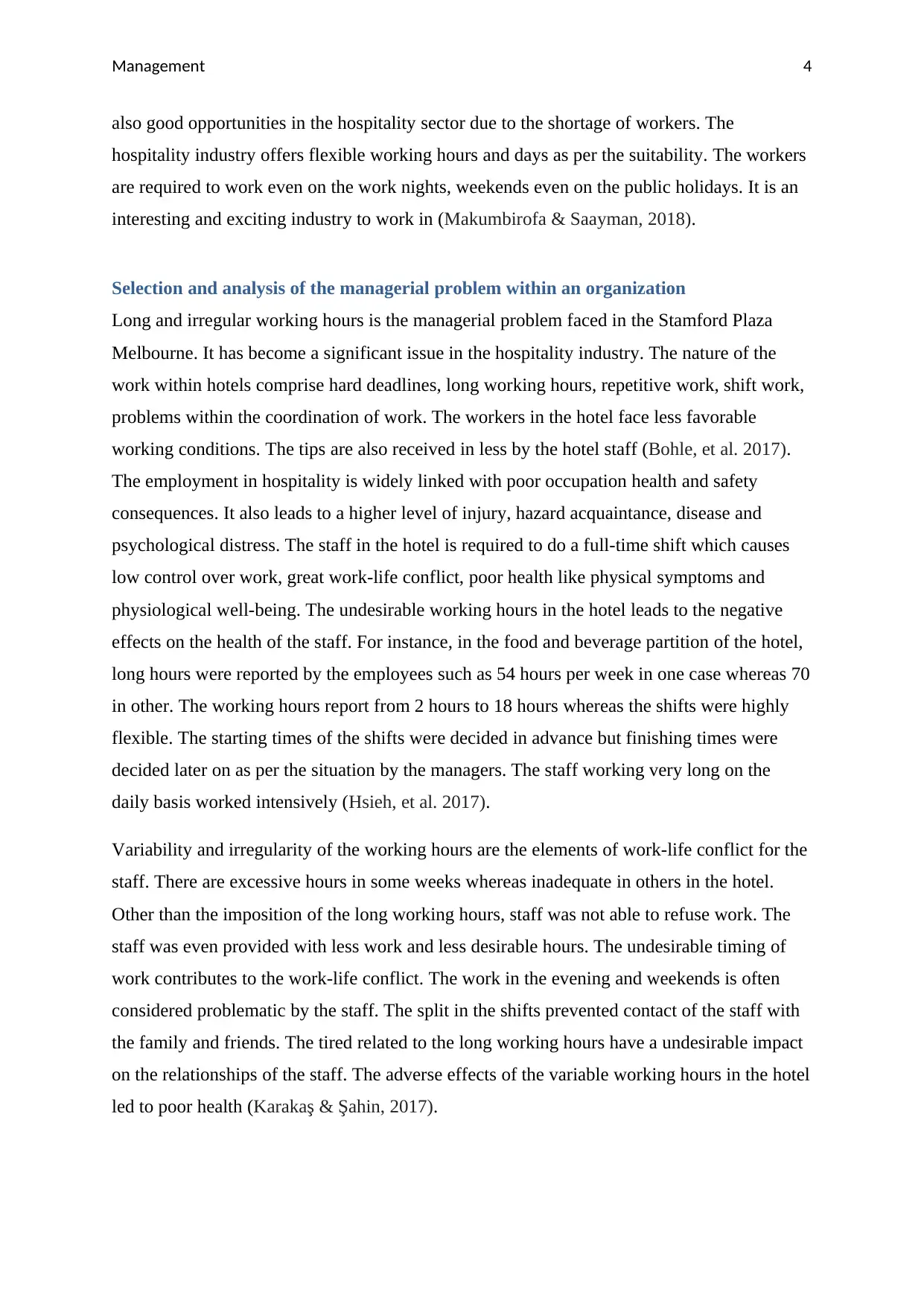
Management 4
also good opportunities in the hospitality sector due to the shortage of workers. The
hospitality industry offers flexible working hours and days as per the suitability. The workers
are required to work even on the work nights, weekends even on the public holidays. It is an
interesting and exciting industry to work in (Makumbirofa & Saayman, 2018).
Selection and analysis of the managerial problem within an organization
Long and irregular working hours is the managerial problem faced in the Stamford Plaza
Melbourne. It has become a significant issue in the hospitality industry. The nature of the
work within hotels comprise hard deadlines, long working hours, repetitive work, shift work,
problems within the coordination of work. The workers in the hotel face less favorable
working conditions. The tips are also received in less by the hotel staff (Bohle, et al. 2017).
The employment in hospitality is widely linked with poor occupation health and safety
consequences. It also leads to a higher level of injury, hazard acquaintance, disease and
psychological distress. The staff in the hotel is required to do a full-time shift which causes
low control over work, great work-life conflict, poor health like physical symptoms and
physiological well-being. The undesirable working hours in the hotel leads to the negative
effects on the health of the staff. For instance, in the food and beverage partition of the hotel,
long hours were reported by the employees such as 54 hours per week in one case whereas 70
in other. The working hours report from 2 hours to 18 hours whereas the shifts were highly
flexible. The starting times of the shifts were decided in advance but finishing times were
decided later on as per the situation by the managers. The staff working very long on the
daily basis worked intensively (Hsieh, et al. 2017).
Variability and irregularity of the working hours are the elements of work-life conflict for the
staff. There are excessive hours in some weeks whereas inadequate in others in the hotel.
Other than the imposition of the long working hours, staff was not able to refuse work. The
staff was even provided with less work and less desirable hours. The undesirable timing of
work contributes to the work-life conflict. The work in the evening and weekends is often
considered problematic by the staff. The split in the shifts prevented contact of the staff with
the family and friends. The tired related to the long working hours have a undesirable impact
on the relationships of the staff. The adverse effects of the variable working hours in the hotel
led to poor health (Karakaş & Şahin, 2017).
also good opportunities in the hospitality sector due to the shortage of workers. The
hospitality industry offers flexible working hours and days as per the suitability. The workers
are required to work even on the work nights, weekends even on the public holidays. It is an
interesting and exciting industry to work in (Makumbirofa & Saayman, 2018).
Selection and analysis of the managerial problem within an organization
Long and irregular working hours is the managerial problem faced in the Stamford Plaza
Melbourne. It has become a significant issue in the hospitality industry. The nature of the
work within hotels comprise hard deadlines, long working hours, repetitive work, shift work,
problems within the coordination of work. The workers in the hotel face less favorable
working conditions. The tips are also received in less by the hotel staff (Bohle, et al. 2017).
The employment in hospitality is widely linked with poor occupation health and safety
consequences. It also leads to a higher level of injury, hazard acquaintance, disease and
psychological distress. The staff in the hotel is required to do a full-time shift which causes
low control over work, great work-life conflict, poor health like physical symptoms and
physiological well-being. The undesirable working hours in the hotel leads to the negative
effects on the health of the staff. For instance, in the food and beverage partition of the hotel,
long hours were reported by the employees such as 54 hours per week in one case whereas 70
in other. The working hours report from 2 hours to 18 hours whereas the shifts were highly
flexible. The starting times of the shifts were decided in advance but finishing times were
decided later on as per the situation by the managers. The staff working very long on the
daily basis worked intensively (Hsieh, et al. 2017).
Variability and irregularity of the working hours are the elements of work-life conflict for the
staff. There are excessive hours in some weeks whereas inadequate in others in the hotel.
Other than the imposition of the long working hours, staff was not able to refuse work. The
staff was even provided with less work and less desirable hours. The undesirable timing of
work contributes to the work-life conflict. The work in the evening and weekends is often
considered problematic by the staff. The split in the shifts prevented contact of the staff with
the family and friends. The tired related to the long working hours have a undesirable impact
on the relationships of the staff. The adverse effects of the variable working hours in the hotel
led to poor health (Karakaş & Şahin, 2017).
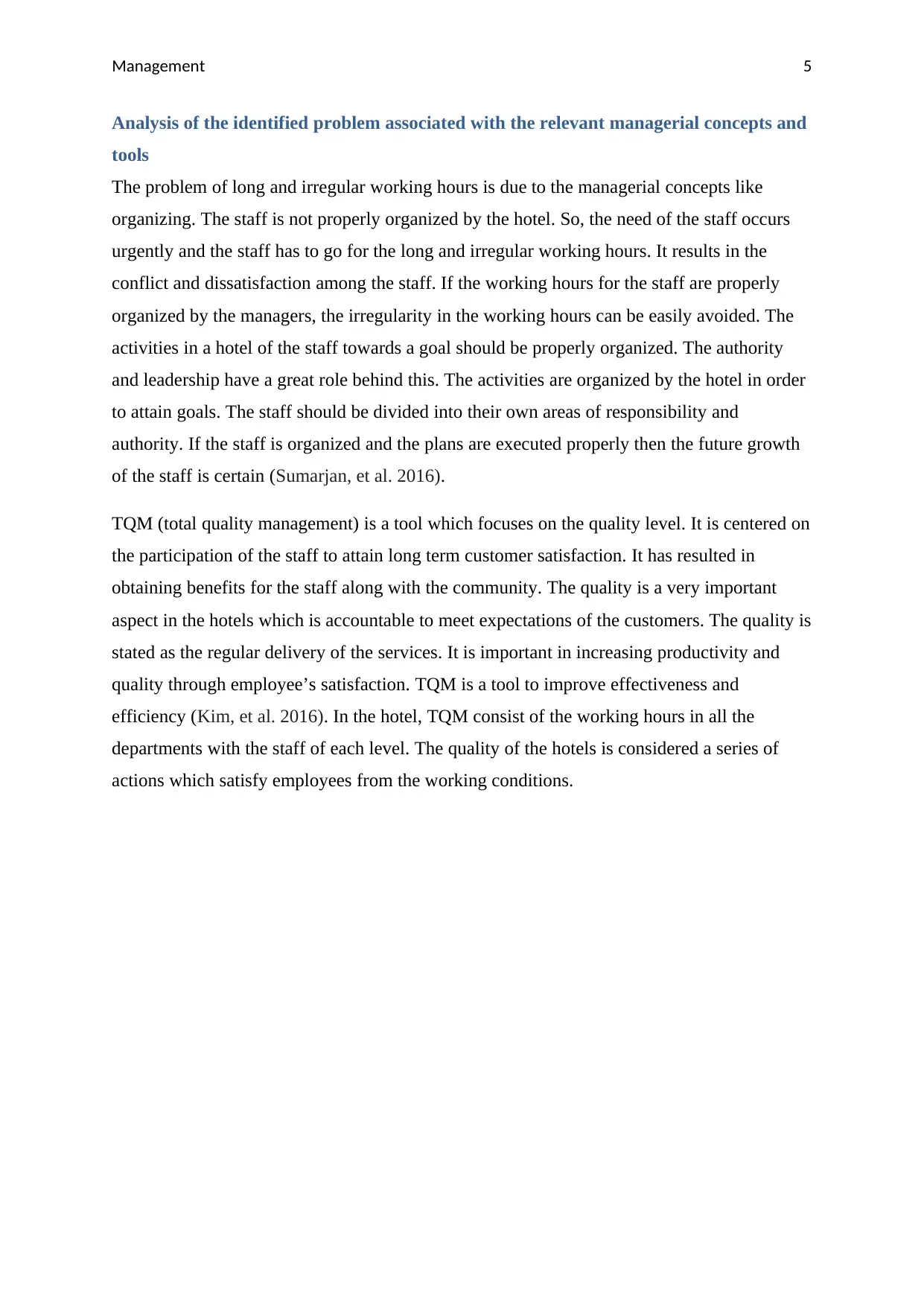
Management 5
Analysis of the identified problem associated with the relevant managerial concepts and
tools
The problem of long and irregular working hours is due to the managerial concepts like
organizing. The staff is not properly organized by the hotel. So, the need of the staff occurs
urgently and the staff has to go for the long and irregular working hours. It results in the
conflict and dissatisfaction among the staff. If the working hours for the staff are properly
organized by the managers, the irregularity in the working hours can be easily avoided. The
activities in a hotel of the staff towards a goal should be properly organized. The authority
and leadership have a great role behind this. The activities are organized by the hotel in order
to attain goals. The staff should be divided into their own areas of responsibility and
authority. If the staff is organized and the plans are executed properly then the future growth
of the staff is certain (Sumarjan, et al. 2016).
TQM (total quality management) is a tool which focuses on the quality level. It is centered on
the participation of the staff to attain long term customer satisfaction. It has resulted in
obtaining benefits for the staff along with the community. The quality is a very important
aspect in the hotels which is accountable to meet expectations of the customers. The quality is
stated as the regular delivery of the services. It is important in increasing productivity and
quality through employee’s satisfaction. TQM is a tool to improve effectiveness and
efficiency (Kim, et al. 2016). In the hotel, TQM consist of the working hours in all the
departments with the staff of each level. The quality of the hotels is considered a series of
actions which satisfy employees from the working conditions.
Analysis of the identified problem associated with the relevant managerial concepts and
tools
The problem of long and irregular working hours is due to the managerial concepts like
organizing. The staff is not properly organized by the hotel. So, the need of the staff occurs
urgently and the staff has to go for the long and irregular working hours. It results in the
conflict and dissatisfaction among the staff. If the working hours for the staff are properly
organized by the managers, the irregularity in the working hours can be easily avoided. The
activities in a hotel of the staff towards a goal should be properly organized. The authority
and leadership have a great role behind this. The activities are organized by the hotel in order
to attain goals. The staff should be divided into their own areas of responsibility and
authority. If the staff is organized and the plans are executed properly then the future growth
of the staff is certain (Sumarjan, et al. 2016).
TQM (total quality management) is a tool which focuses on the quality level. It is centered on
the participation of the staff to attain long term customer satisfaction. It has resulted in
obtaining benefits for the staff along with the community. The quality is a very important
aspect in the hotels which is accountable to meet expectations of the customers. The quality is
stated as the regular delivery of the services. It is important in increasing productivity and
quality through employee’s satisfaction. TQM is a tool to improve effectiveness and
efficiency (Kim, et al. 2016). In the hotel, TQM consist of the working hours in all the
departments with the staff of each level. The quality of the hotels is considered a series of
actions which satisfy employees from the working conditions.
⊘ This is a preview!⊘
Do you want full access?
Subscribe today to unlock all pages.

Trusted by 1+ million students worldwide
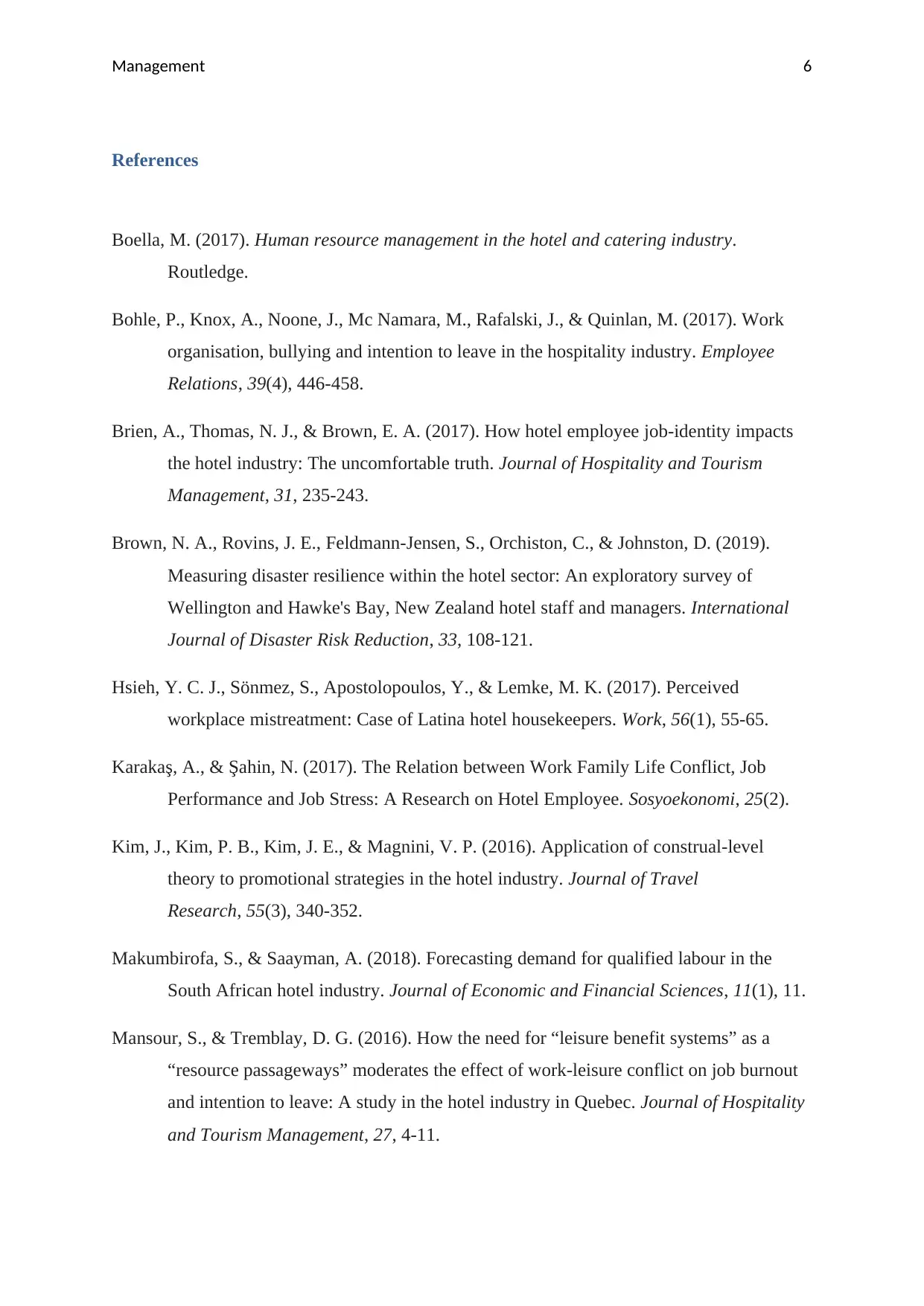
Management 6
References
Boella, M. (2017). Human resource management in the hotel and catering industry.
Routledge.
Bohle, P., Knox, A., Noone, J., Mc Namara, M., Rafalski, J., & Quinlan, M. (2017). Work
organisation, bullying and intention to leave in the hospitality industry. Employee
Relations, 39(4), 446-458.
Brien, A., Thomas, N. J., & Brown, E. A. (2017). How hotel employee job-identity impacts
the hotel industry: The uncomfortable truth. Journal of Hospitality and Tourism
Management, 31, 235-243.
Brown, N. A., Rovins, J. E., Feldmann-Jensen, S., Orchiston, C., & Johnston, D. (2019).
Measuring disaster resilience within the hotel sector: An exploratory survey of
Wellington and Hawke's Bay, New Zealand hotel staff and managers. International
Journal of Disaster Risk Reduction, 33, 108-121.
Hsieh, Y. C. J., Sönmez, S., Apostolopoulos, Y., & Lemke, M. K. (2017). Perceived
workplace mistreatment: Case of Latina hotel housekeepers. Work, 56(1), 55-65.
Karakaş, A., & Şahin, N. (2017). The Relation between Work Family Life Conflict, Job
Performance and Job Stress: A Research on Hotel Employee. Sosyoekonomi, 25(2).
Kim, J., Kim, P. B., Kim, J. E., & Magnini, V. P. (2016). Application of construal-level
theory to promotional strategies in the hotel industry. Journal of Travel
Research, 55(3), 340-352.
Makumbirofa, S., & Saayman, A. (2018). Forecasting demand for qualified labour in the
South African hotel industry. Journal of Economic and Financial Sciences, 11(1), 11.
Mansour, S., & Tremblay, D. G. (2016). How the need for “leisure benefit systems” as a
“resource passageways” moderates the effect of work-leisure conflict on job burnout
and intention to leave: A study in the hotel industry in Quebec. Journal of Hospitality
and Tourism Management, 27, 4-11.
References
Boella, M. (2017). Human resource management in the hotel and catering industry.
Routledge.
Bohle, P., Knox, A., Noone, J., Mc Namara, M., Rafalski, J., & Quinlan, M. (2017). Work
organisation, bullying and intention to leave in the hospitality industry. Employee
Relations, 39(4), 446-458.
Brien, A., Thomas, N. J., & Brown, E. A. (2017). How hotel employee job-identity impacts
the hotel industry: The uncomfortable truth. Journal of Hospitality and Tourism
Management, 31, 235-243.
Brown, N. A., Rovins, J. E., Feldmann-Jensen, S., Orchiston, C., & Johnston, D. (2019).
Measuring disaster resilience within the hotel sector: An exploratory survey of
Wellington and Hawke's Bay, New Zealand hotel staff and managers. International
Journal of Disaster Risk Reduction, 33, 108-121.
Hsieh, Y. C. J., Sönmez, S., Apostolopoulos, Y., & Lemke, M. K. (2017). Perceived
workplace mistreatment: Case of Latina hotel housekeepers. Work, 56(1), 55-65.
Karakaş, A., & Şahin, N. (2017). The Relation between Work Family Life Conflict, Job
Performance and Job Stress: A Research on Hotel Employee. Sosyoekonomi, 25(2).
Kim, J., Kim, P. B., Kim, J. E., & Magnini, V. P. (2016). Application of construal-level
theory to promotional strategies in the hotel industry. Journal of Travel
Research, 55(3), 340-352.
Makumbirofa, S., & Saayman, A. (2018). Forecasting demand for qualified labour in the
South African hotel industry. Journal of Economic and Financial Sciences, 11(1), 11.
Mansour, S., & Tremblay, D. G. (2016). How the need for “leisure benefit systems” as a
“resource passageways” moderates the effect of work-leisure conflict on job burnout
and intention to leave: A study in the hotel industry in Quebec. Journal of Hospitality
and Tourism Management, 27, 4-11.
Paraphrase This Document
Need a fresh take? Get an instant paraphrase of this document with our AI Paraphraser
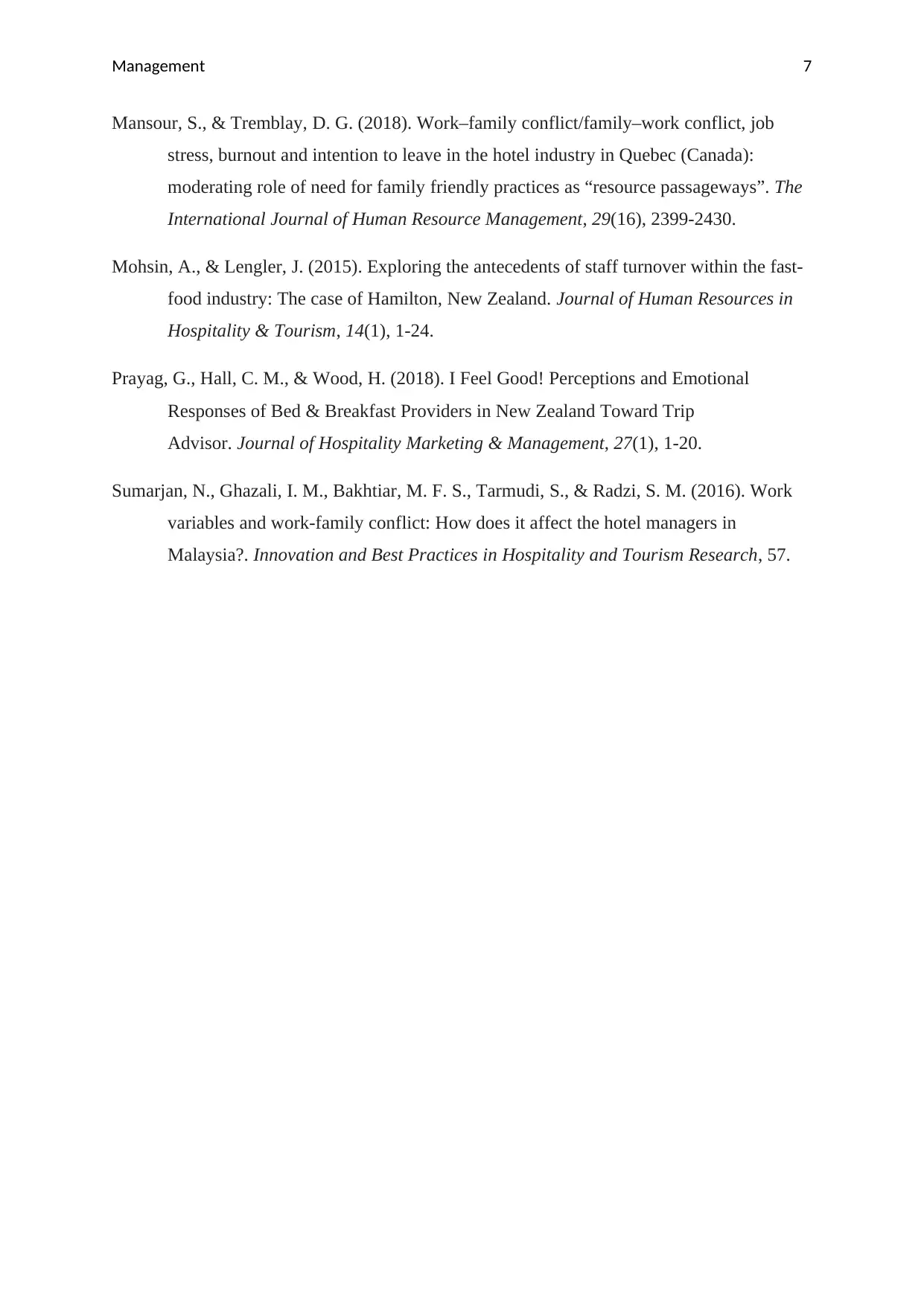
Management 7
Mansour, S., & Tremblay, D. G. (2018). Work–family conflict/family–work conflict, job
stress, burnout and intention to leave in the hotel industry in Quebec (Canada):
moderating role of need for family friendly practices as “resource passageways”. The
International Journal of Human Resource Management, 29(16), 2399-2430.
Mohsin, A., & Lengler, J. (2015). Exploring the antecedents of staff turnover within the fast-
food industry: The case of Hamilton, New Zealand. Journal of Human Resources in
Hospitality & Tourism, 14(1), 1-24.
Prayag, G., Hall, C. M., & Wood, H. (2018). I Feel Good! Perceptions and Emotional
Responses of Bed & Breakfast Providers in New Zealand Toward Trip
Advisor. Journal of Hospitality Marketing & Management, 27(1), 1-20.
Sumarjan, N., Ghazali, I. M., Bakhtiar, M. F. S., Tarmudi, S., & Radzi, S. M. (2016). Work
variables and work-family conflict: How does it affect the hotel managers in
Malaysia?. Innovation and Best Practices in Hospitality and Tourism Research, 57.
Mansour, S., & Tremblay, D. G. (2018). Work–family conflict/family–work conflict, job
stress, burnout and intention to leave in the hotel industry in Quebec (Canada):
moderating role of need for family friendly practices as “resource passageways”. The
International Journal of Human Resource Management, 29(16), 2399-2430.
Mohsin, A., & Lengler, J. (2015). Exploring the antecedents of staff turnover within the fast-
food industry: The case of Hamilton, New Zealand. Journal of Human Resources in
Hospitality & Tourism, 14(1), 1-24.
Prayag, G., Hall, C. M., & Wood, H. (2018). I Feel Good! Perceptions and Emotional
Responses of Bed & Breakfast Providers in New Zealand Toward Trip
Advisor. Journal of Hospitality Marketing & Management, 27(1), 1-20.
Sumarjan, N., Ghazali, I. M., Bakhtiar, M. F. S., Tarmudi, S., & Radzi, S. M. (2016). Work
variables and work-family conflict: How does it affect the hotel managers in
Malaysia?. Innovation and Best Practices in Hospitality and Tourism Research, 57.
1 out of 8
Related Documents
Your All-in-One AI-Powered Toolkit for Academic Success.
+13062052269
info@desklib.com
Available 24*7 on WhatsApp / Email
![[object Object]](/_next/static/media/star-bottom.7253800d.svg)
Unlock your academic potential
Copyright © 2020–2026 A2Z Services. All Rights Reserved. Developed and managed by ZUCOL.



